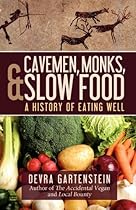Cavemen, Monks, and Slow Food: A History of Eating Well

| Author | : | |
| Rating | : | 4.79 (943 Votes) |
| Asin | : | 0615437273 |
| Format Type | : | paperback |
| Number of Pages | : | 236 Pages |
| Publish Date | : | 2016-06-09 |
| Language | : | English |
DESCRIPTION:
. About the Author Gartenstein is owner of a vegan catering business
Today, sugar is so cheap that food manufacturers use it for filler, and we rhapsodize about the fresh, local ingredients that medieval peasants grew in their kitchen gardens. This book tells the riveting tale of our perpetually unfolding relationship with food, while offering needed perspectives on urgent modern concerns.. Cavemen, Monks, and Slow Food: A History of Eating Well tells the fascinating story of our relationship with our meals, from the Paleolithic hunters who painted their prey on remote cave walls, to the medieval monks who fashioned fine cheeses and liqueurs, to the artisans and organic farmers who supply today's trendy restaurants. During the Middle Ages, when sugar was rare and expensive, rotten teeth were a status symbol
Gartenstein is owner of a vegan catering business.
Beth Jusino said Why do we eat the way we do?. There are plenty of books out there that tell us what to eat, but this is a rare find that explores WHY we like what we do. From the earliest hunter/gatherers to the (surprisingly less healthy) farmers, to the gluttony of the early American expansion, Never preachy, always interesting, Gartenstein looks at quantity and quality, and points the way for us to understand the context of our own relationships with food. This is a great read
